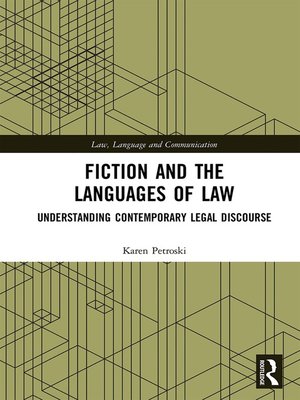Fiction and the Languages of Law
ebook ∣ Understanding Contemporary Legal Discourse · Law, Language and Communication
By Karen Petroski

Sign up to save your library
With an OverDrive account, you can save your favorite libraries for at-a-glance information about availability. Find out more about OverDrive accounts.
Find this title in Libby, the library reading app by OverDrive.



Search for a digital library with this title
Title found at these libraries:
| Library Name | Distance |
|---|---|
| Loading... |
Contemporary legal reasoning has more in common with fictional discourse than we tend to realize. Through an examination of the U.S. Supreme Court's written output during a recent landmark term, this book exposes many of the parallels between these two special kinds of language use. Focusing on linguistic and rhetorical patterns in the dozens of reasoned opinions issued by the Court between October 2014 and June 2015, the book takes nonlawyer readers on a lively tour of contemporary American legal reasoning and acquaints legal readers with some surprising features of their own thinking and writing habits. It analyzes cases addressing a huge variety of issues, ranging from the rights of drivers stopped by the police to the decision-making processes of the Environmental Protection Agency—as well as the term's best-known case, which recognized a constitutional right to marriage for same-sex as well as different-sex couples. Fiction and the Languages of Law reframes a number of long-running legal debates, identifies other related paradoxes within legal discourse, and traces them all to common sources: judges' and lawyers' habit of alternating unselfconsciously between two different attitudes toward the language they use, and a set of professional biases that tends to prevent scrutiny of that habit.







